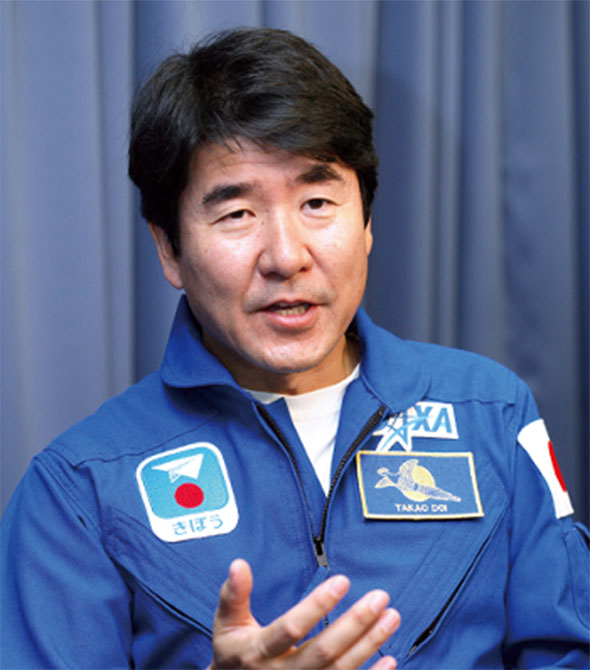- Interview with Astronaut Takao Doi
Manned space activities - Contemporary Liberal Arts Courses
State-of-the-art research and corporate technology for space migration - Data Science Courses for Workers
-Analysis and processing methods that can be used in the field- - What is needed for modern interpersonal assistance?
On the creation of new areas and challenges - About Kyoto College Members
- Inquiries
Special Lecture “Manned Space Activities” with Astronaut Takao Doi
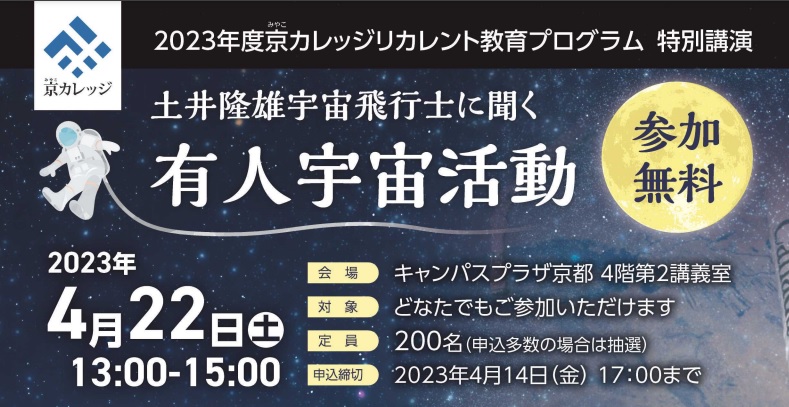
Abstract
Since Gagarin’s first manned space flight in 1961, space has become a new world for humanity. Japan’s “Phase 1 Manned Space Activity” began in 1985 with the decision to participate in the International Space Station program and the selection of Japan astronauts to participate in the first materials experiment, and the “Second Phase of Manned Space Activity” began in 2008 with the mission to attach the Japan Experiment Module “Kibo” to the space station. What are the goals of manned space activities in Japan and around the world, and where are we going? In the lecture, Dr. Doi, who was the first Japan person to carry out spacewalks, will look back on the path of “learning” so far, and talk about what manned space activities mean to humankind.
| Date | Saturday, April 22, 2023 13:00~15:00 |
| Target | Anyone is welcome to participate |
| Occupancy | 200 people (if there are many applications, a lottery will be held) |
| Fees | free |
| Application Deadline | Friday, April 14, 2023 17:00 |
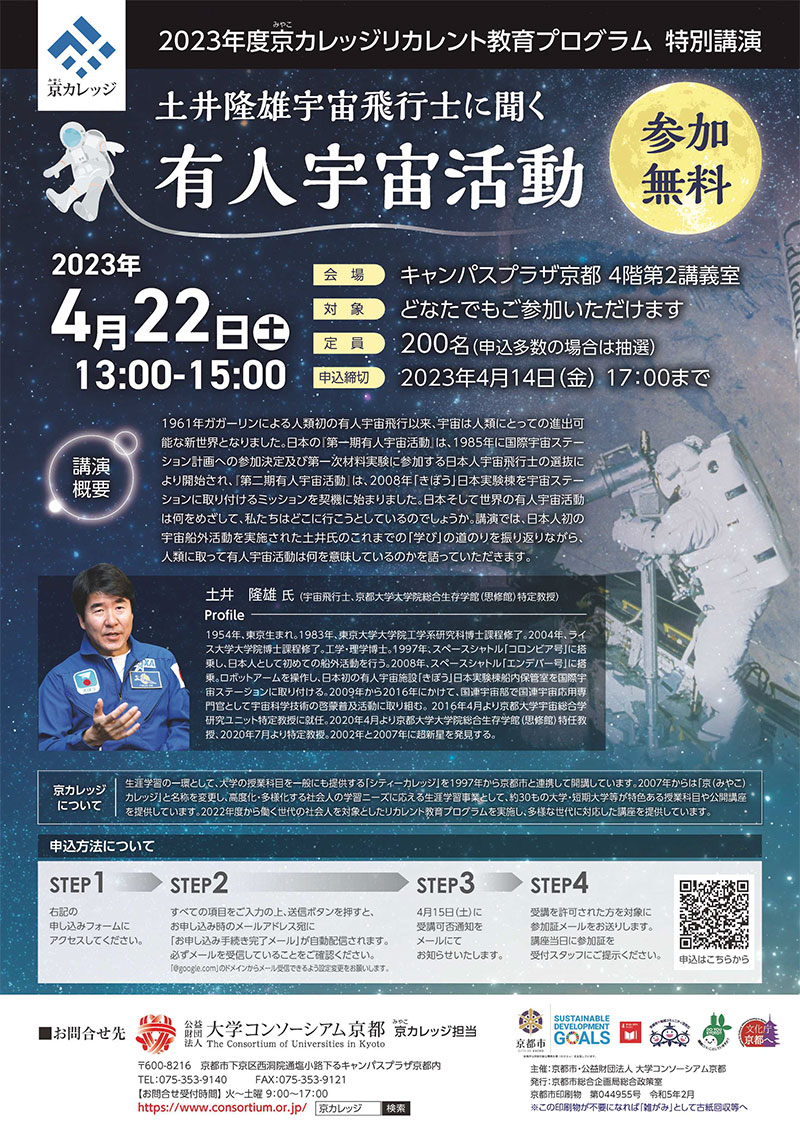
You can download the flyer here.
Flyer
Interview with Astronaut Takao Doi on “Manned Space Activities” [PDF]
Flow from application to enrollment
Applications are now closed.
STEP①
Please click the “Apply” button below, fill in the required information, and apply by 17:00 on Friday, April 14, 2023.
STEP②
If you enter all the items and press the send button, an “application procedure completion email” will be automatically sent to the email address at the time of application. Make sure you’re receiving the email.
* Please change the settings so that you can receive emails from the “@google.com” domain.
STEP③
You will be notified of your availability by email on Saturday, April 15, 2023.
STEP④
We will send you a certificate of participation email to those who are allowed to take the course. Please present your participation certificate to the reception staff on the day of the course.
Meet the Instructors
| identity | Takao Doi Astronaut, Professor, Kyoto University Graduate School of Sustainable Survival (Shishukan) |
| Biography | Born in Tokyo in 1954. In 1983, he completed a doctoral program at the University of Tokyo’s Graduate School of Engineering. In 2004, he completed his Ph.D. at Rice University. Doctor of Engineering and Science. In 1997, he boarded the space shuttle Columbia and became the first Japan to perform a spacewalk. In 2008, he boarded the space shuttle Endeavour. By operating a robot arm, the storage room of the Japan Experiment Module “Kibo”, the first manned space facility by Japan, will be attached to the International Space Station. From 2009 to 2016, he worked as a UN Space Application Specialist at the United Nations Office for Outer Space Affairs. In April 2016, he was appointed as a professor at the Space Science Research Unit, Kyoto University. Since April 2020, he has been a Designated Professor at the Graduate School of Sustainable Survivability, Kyoto University, and since July 2020, he has been a Designated Professor. Supernovae were discovered in 2002 and 2007. |
Contemporary Liberal Arts Lecture “Cutting-edge Research and Corporate Technology for Space Migration”
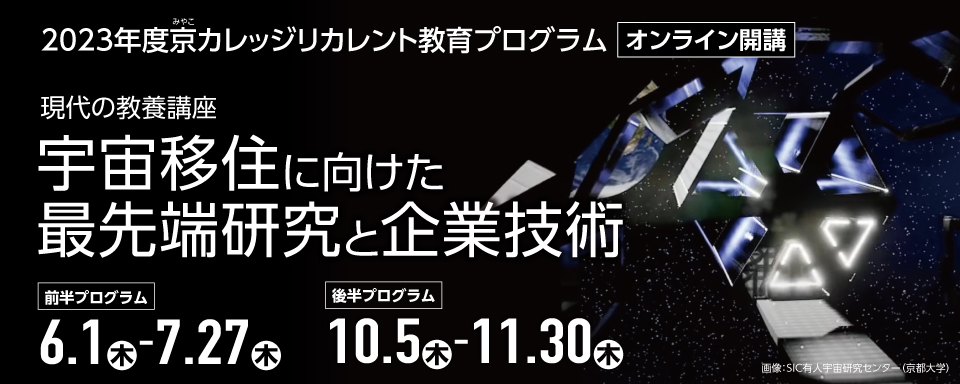
Outline of the lecture
The “Contemporary Liberal Arts Course: The Present and Future of Space Migration” was launched last year with the concept of “Even adults want to learn!” and received overwhelming satisfaction from participants. This year, students will learn about the current state of manned space science and technology with an eye on the 2030s and beyond, along with cutting-edge research results and corporate ideas, as well as renewed content. To think about space migration is to think about the global environment, food and living space, mobility technology, the human body and medicine, and business and society. Curiosity for the future. Learn what you want to learn.
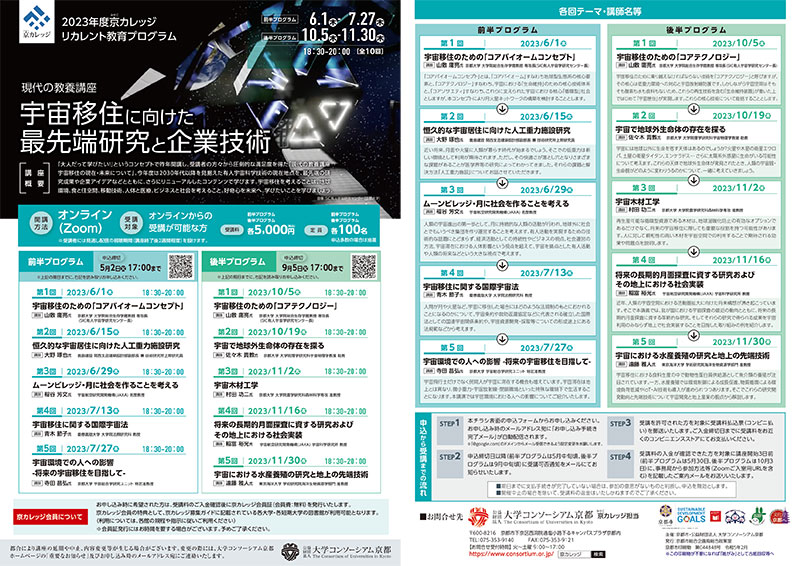
You can download the flyer here.
Course Period
First Half Program
Thursday, June 1, 2023 – Thursday, July 27, 2023 18:30-20:00 <5 sessions>
Second Half Program
Thursday, October 5, 2023 – Thursday, November 30, 2023 18:30-20:00 <5 sessions>
How to start the course
Online (Zoom)
Tuition Fee
First half program 5,000 yen (tax included) / Second half program 5,000 yen (tax included)
Eligibility
Only for those who can take the course online
Capacity
100 people in the first half of the program / 100 people in the second half of the program * If there are many applications, a lottery will be held.
Flyer
Contemporary Liberal Arts Lecture “Cutting-edge Research and Corporate Technology for Space Migration” [PDF]
Flow from application to enrollment
Applications are now closed.
STEP①
Please click the “Apply” button below, fill out the required information, and apply for the first half program by 23:59 on Thursday, May 11, 2023, and by 23:59 on Monday, September 18, 2023 for the second program. If you enter all the items and press the send button, an “application procedure completion email” will be automatically sent to the email address at the time of application.
* Please change the settings so that you can receive emails from the “@google.com” domain.
STEP②
After the application deadline (around mid-May for the first half of the program and mid-September for the second half), you will be notified of your acceptance by e-mail.
STEP③
For those who are allowed to take the course, we will mail you a tuition fee payment slip (convenience store payment). Please pay the tuition fee at a nearby convenience store by the payment deadline.
STEP④
For those who have confirmed the payment of the course fee, the secretariat will send an e-mail with information on how to participate (including the URL for entering the Zoom room) three days before the start of the course (May 30 for the first half of the course and October 3 for the second half).
About the content of the course
The program will be conducted with the following contents.
[First half program]
|
Date & Time: June 1 (Thu) 18:30~20:00 Theme: “Core Biome Concept” for Space Migration Lecturer: Yosuke Yamashiki (Professor, Graduate School of Comprehensive Survivability, Kyoto University (Director, SIC Center for Human Cosmology)) |
|
| The “Core Biome Concept” is defined as the core elements of the “core biome” or terrestrial ecosystem, the “core technology” or core technology system for “life support” in space, and the “core society” or the core “recycling” society in the universe supported by these. | |
|
Date & Time: June 15 (Thu) 18:30~20:00 Theme: Research on Artificial Gravity Facilities for Permanent Space Habitation Lecturer: Takuya Ohno (Deputy General Manager, Architectural Design Department, Kansai Branch, Kajima Corporation and Senior Researcher, Technical Research Institute) |
|
| In the near future, the era of human beings living on the moon and Mars will begin. The low gravity there is expected to be used as a new environment. However, research in the medical community and others has shown that comfort is a pitfall and there are various issues. I would like to talk about these issues and how to solve them, “artificial gravity facilities”. | |
|
Date & Time: June 29 (Thu) 18:30~20:00 Theme: Moon Village: Thinking about creating a society on the moon Lecturer: Yoshifumi Inaya (Professor Emeritus, Japan Aerospace Exploration Agency (JAXA)) |
|
| As the first step in humankind’s expansion into space, we will consider sustainable human activities on the moon, and the creation and operation of a group that can be called a society outside the earth. In addition to the technical topics for realizing manned activities, we will consider the sustainability of economic activities, business perspectives, social management methods, and the impact of space stays on the human body, as well as space-based manned activities and the future of humanity. | |
|
Date & Time: July 13 (Thu) 18:30~20:00 Theme: International Space Law on Space Migration Lecturer: Setsuko Aoki (Professor, Keio University Law School) |
|
| We will consider what kind of laws and regulations will be subject to when humans migrate to space, such as the Moon and Mars, from the perspective of the United Nations Outer Space Convention as an established international law represented by the Outer Space Treaty and the Rescue and Return Agreement, as well as legal norms that are still in the process of being formed regarding the development and extraction of space resources. | |
|
Date & Time: July 27 (Thu) 18:30~20:00 Theme: Impact on Humans in the Space Environment -Toward Future Space Migration- Lecturer: Masahiro Terada (Associate Professor, Space Science Research Unit, Kyoto University) |
|
| There are also more opportunities for not only astronauts, but also civilians to stay in space. Staying in space is different from the ground, and you will live in a special environment such as microgravity, cosmic radiation, and a closed environment. In this lecture, we will introduce the impact on humans in the space environment. | |
[Second Half Program]
|
Date & Time: Thursday, October 5, 18:30~20:00 Theme: “Core Technologies” for Space Migration Lecturer: Yosuke Yamashiki (Professor, Graduate School of Comprehensive Survivability, Kyoto University (Director, SIC Center for Human Cosmology)) |
|
| The technologies that must be overcome in order to migrate to space are called “core technologies,” and at the core of these technologies are the ability to cope with low-gravity environments and protection against space radiation. However, since there is no oxygen, water, or food in outer space, “space habitation” can only be realized after the “life support system” including these regenerative technologies operates. I would like to summarize these core technologies. | |
|
Date & Time: Thursday, October 19, 18:30~20:00 Theme: Exploring the existence of extraterrestrial life in space Lecturer: Takanori Sasaki (Assistant Professor, Department of Astrophysics, Graduate School of Science, Kyoto University) |
|
| Are there any other celestial bodies in the universe that harbor life other than the Earth? Mars and Jupiter’s moons Europa, Saturn’s moons Titan, Enceladus… In addition, we will consider the possibility of life on exoplanets. Let’s think together about how the discovery of extraterrestrial life on these celestial bodies could change humanity’s view of the universe and life. | |
|
Date & Time: November 2 (Thu) 18:30~20:00 Theme: Space Wood Engineering Lecturer: Koji Murata (Associate Professor, Department of Forest Science, Graduate School of Agriculture, Kyoto University) |
|
| As a reproducible and circular resource, wood is not only an effective option for preventing global warming, but also has the potential to play an important role in future space migration. We will explain the expected effects and problems of using wood that has a high affinity for humans in outer space. | |
|
Date & Time: Thursday, November 16, 18:30~20:00 Theme: Research that will contribute to long-term lunar exploration in the future and its social implementation on the ground Lecturer: Hiromitsu Inatomi (Professor, Institute of Space and Astronautical Science, Japan Aerospace Exploration Agency (JAXA)) |
|
| In recent years, there has been a lot of speculation about the future of humanity to expand its sphere of activity in outer space. In this lecture, we will introduce recent trends in space exploration in Japan, innovative research that will contribute to long-term lunar exploration in the future, and examples of initiatives aimed at implementing the results of these research not only in space but also on the ground. | |
|
Date & Time: Thursday, November 30, 18:30~20:00 Theme: Research on aquaculture in space and advanced technology on the ground Lecturer: Masato Endo (Associate Professor, Department of Marine Bioresources, Faculty of Marine Science and Technology, Tokyo University of Marine Science and Technology) |
|
| Aquaculture of fish and shellfish is attracting attention as a source of animal protein in food production during space migration. On the other hand, in aquaculture, growth promotion through environmental control, reduction of environmental impact through material circulation, and the introduction of IoT and AI technologies are also being promoted. Therefore, we will explain these R&D trends and advanced technologies from the perspective of space development and the ground industry. | |
Data Science Course for Workers-Analysis and Processing Methods that Can Be Used in the Field-
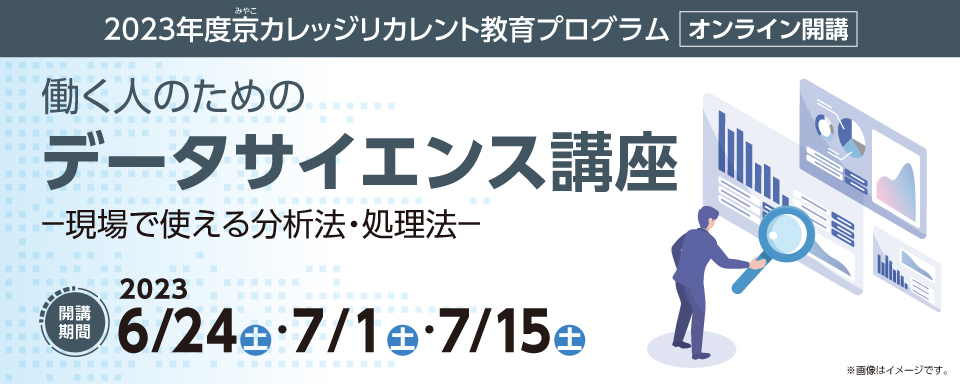
Outline of the lecture
In this course, we aim to quantify what we feel with our senses by learning how to observe and analyze data using Excel and the free software “R Commander”.
First, we learn estimatory statistics, which infer from a piece of data about the unknown overall characteristics behind it. Next, you will learn multivariate analysis, which deals with multiple variables (variates) at the same time. You’ll also learn about the pre-processing required before you can perform an analysis. Finally, we will work on a holistic challenge to deepen our learning.
Through these studies, students will be able to confirm whether there is a difference between two data sets, analyze whether a factor has affected a thing, elucidate causal relationships between variables, and summarize and classify information.
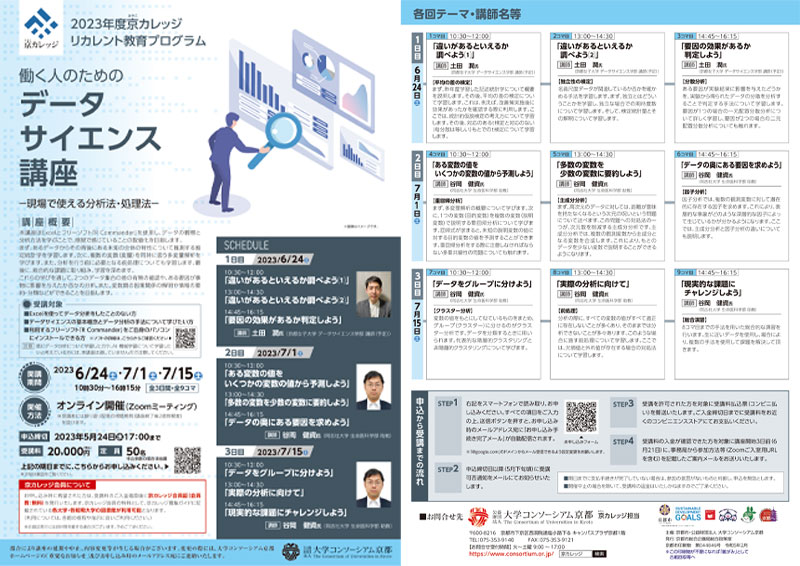
You can download the flyer here.
Course Period
Saturday, June 24, 2023 – Saturday, July 15, 2023, 10:30 a.m. – 4:15 p.m. <3 days, 9 sessions>
How to start the course
Online (Zoom)
Tuition Fee
20,000 yen (3 days, 9 sessions)
Eligibility
– Those who want to learn the basic concepts of data science and data analysis methods
– Those who have never used Excel to analyze data
・ Those who can install the free software “R Commandar” to be used on your own computer
* For details of free software, please check the following URL.
https://personal.hs.hirosaki-u.ac.jp/pteiki/research/yodosha/second.html
< Attention>
Please note that this course is not suitable for those who have already learned about data analysis or want to learn about AI and machine learning.
Capacity
50 people (if there are many applications, a lottery will be held)
Flyer
“Data Science Lecture for Workers: Analysis and Processing Methods That Can Be Used in the Field” [PDF]
Flow from application to enrollment
Applications are now closed.
STEP①
Please click the “Apply” button below, fill in the required information, and apply by 23:59 on Thursday, June 1, 2023. If you enter all the items and press the send button, an “application procedure completion email” will be automatically sent to the email address at the time of application.
* Please change the settings so that you can receive emails from the “@google.com” domain.
STEP②
After the application deadline (around the end of May), you will be notified of your availability by e-mail.
STEP③
For those who are allowed to take the course, we will mail you a tuition fee payment slip (convenience store payment). Please pay the tuition fee at a nearby convenience store by the payment deadline.
STEP④
For those who have confirmed the payment of the course fee, the secretariat will send an e-mail with information on how to participate (including the URL for entering the Zoom room) 3 days before the start of the course (June 21).
About the content of the course
The program will be conducted with the following contents.
Day 1: Saturday, June 24, 2023
Lecturer: Jun Tsuchida (Lecturer, Faculty of Data Science, Kyoto Women’s University (planned))
|
<1st session> 10:30~12:00 Theme: “Let’s find out if there is a difference (1)” |
|
|
Test for differences in < means> First, I will give an overview of the descriptive statistics that I learned last year. You will then learn about testing for differences in means. This is used, for example, to check whether the improvement measures have been effective after they have been implemented. In this section, you will learn about the concept of statistical hypothesis testing. After that, you will learn about paired and unpaired t-tests (population variances are equal). |
|
|
<2nd session> 13:00~14:30 Theme: “Let’s find out if there is a difference (2)” |
|
|
< Independence Test> You will learn how to check whether nominal scale data is related or not. First, you will learn what it means to be independent, and you will learn about the expected frequency of independence. You will then learn about test statistics and their interpretation. |
|
|
<3rd session> 14:40~16:10 Theme: “Let’s Judge the Effect of Factors” |
|
|
< Analysis of Variance > Students will learn how to determine whether a factor affected the results of an experiment by analyzing the variance of the data obtained from the experiment. We will learn more about one-way ANOVA when there is one factor, and we will also talk about two-way ANOVA when there are two factors. |
|
Day 2: Saturday, July 1, 2023
Lecturer: Dr. Kenji Tanioka (Assistant Professor, Faculty of Biomedical Sciences, Doshisha University)
|
< 4th session> 10:30~12:00 Theme: “Let’s predict the value of a variable from the value of several variables” |
|
|
First, you’ll learn about an overview of multivariate analysis. Next, you will learn about multiple regression analysis, in which one variable (the objective variable) is described by multiple variables (explanatory variables). Once the regression equation is found, it is possible to predict the value of the objective variable relative to the value of an unknown explanatory variable. We will also touch on the problem of multicollinearity, which must be noted when performing multiple regression analysis. |
|
|
5th session 13:00~14:30 Theme: “Let’s summarize a large number of variables into a small number of variables” |
|
|
Principal Component Analysis First, we will discuss the problem of the dimensional curse, in which distance becomes meaningless for high-dimensional data. One way to address this problem is to use principal component analysis, which reduces the number of dimensions. Principal component analysis synthesizes principal component variables from multiple observation variables. This makes it possible to explain the original data with fewer variables. |
|
|
6th session 14:40~16:10 Theme: “Let’s find the factors behind the data” |
|
|
Factor Analysis Factor analysis seeks out factors that are potentially present for multiple observed variables. This makes it possible to understand what kind of deep factors cause superficial events. This section also discusses the differences between principal component analysis and factor analysis. |
|
Day 3: Saturday, July 15, 2023
Lecturer: Dr. Kenji Tanioka (Assistant Professor, Faculty of Biomedical Sciences, Doshisha University)
|
7th session 10:30~12:00 Theme: “Let’s divide data into groups” |
|
|
Cluster Analysis Cluster analysis is the process of grouping similar things based on the values of variables and dividing them into groups (clusters). It is used to classify data. Learn about typical hierarchical and non-hierarchical clustering. |
|
|
8th session 13:00~14:30 Theme: “Towards Actual Analysis” |
|
|
pre-processing During analysis, it is often the case that the values of all variables are not all correct, and it is often not possible to analyze them as they are. Learn about the pre-treatment to be applied in such cases. In this section, you’ll learn what to do when missing and outliers exist. |
|
|
9th session 14:40~16:10 Theme: “Let’s take on realistic challenges” |
|
|
Comprehensive Exercise We will conduct comprehensive exercises using methods up to the eighth session. We use data that is close to raw and, in some cases, use multiple methods to solve problems. |
|
What is needed for modern human assistance: Generating new areas and challenges
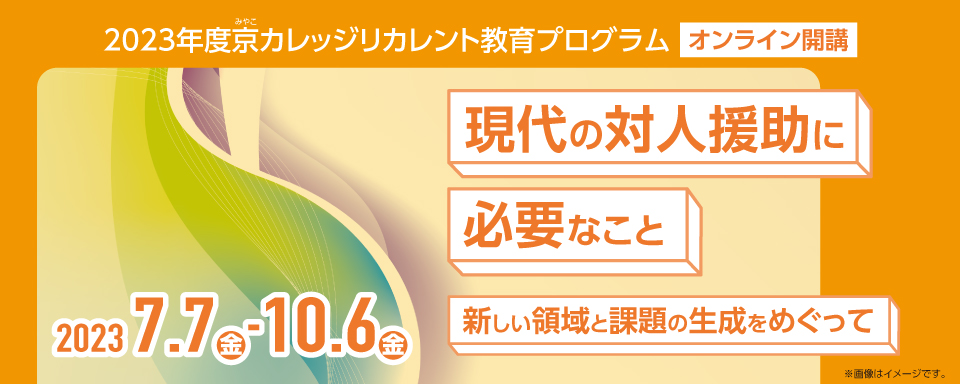
Outline of the lecture
I think we are becoming a society that is difficult to live in. In response to this, a variety of practical and clinical initiatives are being promoted as a social issue to realize human well-being and happiness. In fields that are traditionally divided into occupational areas, such as medical care, nursing, education, psychology, welfare, and the judiciary, there is an increasing need for multidisciplinary collaboration and collaborative efforts. In the academic dimension as well, there are challenges in new areas. We will integrate it as “interpersonal assistance” and learn from the knowledge of the front line that explores human potential. It is the development of knowledge where practice, academia, and clinical practice intersect. Broaden the horizons of professionals. We are looking forward to taking this course if you are a professional who continues to learn.
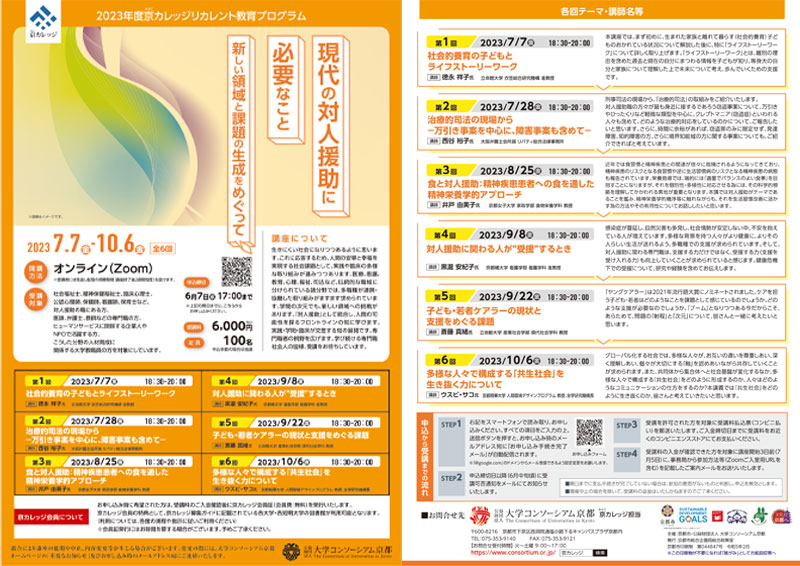
You can download the flyer here.
Course Period
Friday, July 7, 2023 – Friday, October 6, 2023, 6:30 p.m. – 8:00 p.m. 6 days, 6 sessions
How to start the course
Online (Zoom)
Tuition Fee
6,000 yen (6 days, 6 sessions)
Eligibility
■ Those who are in the field of human support, such as social workers, mental health workers, clinical psychologists, certified psychologists, public health nurses, childcare workers, etc.
■ Doctors, lawyers, teachers, and other professionals
■ Those who are active in business people and NPOs related to human services
■University faculty and staff involved in human resource development in these fields
Capacity
100 people (if there are many applications, a lottery will be held)
Flyer
“What is necessary for modern human assistance: Concerning the generation of new areas and challenges” [PDF]
Flow from application to enrollment
Applications are now closed.
STEP①
Please click the “Apply” button below, fill in the required information, and apply by 23:59 on Tuesday, June 13, 2023. If you enter all the items and press the send button, an “application procedure completion email” will be automatically sent to the email address at the time of application.
* Please change the settings so that you can receive emails from the “@google.com” domain.
STEP②
After the application deadline (around mid-June), you will be notified of your availability by e-mail.
STEP③
For those who are allowed to take the course, we will mail you a tuition fee payment slip (convenience store payment). Please pay the tuition fee at a nearby convenience store by the payment deadline.
STEP④
For those who have confirmed the payment of the course fee, the secretariat will send an e-mail with information on how to participate (including the URL for entering the Zoom room) 3 days before the start of the course (July 5).
About the content of the course
The program will be conducted with the following contents.
|
Date Time: July 7 (Fri) 18:30~20:00 Theme: Socially Raised Children and Life Story Work Lecturer: Sachiko Tokunaga (Associate Professor, Kinugasa Research Organization, Ritsumeikan University) |
|
| In this course, we will first explain the situation of children who live apart from their birth families (social care), and then take up “life story work” in particular. “Life Story Work” is a support program that helps children learn information about their past and present selves, including the reasons for separation, and to think about the future and move forward with a life-size understanding of themselves and their families. | |
|
Date Time: July 28 (Fri) 18:30~20:00 Theme: From the Field of Therapeutic Justice – Focusing on Shoplifting Cases and Including Disability Cases Lecturer: Yuko Nishitani (Osaka Bar Association, Liberty Associates) |
|
|
From the field of criminal justice, we will introduce the efforts of “therapeutic justice”. I would like to report on what kind of therapeutic measures are being taken for theft cases, which are likely to be most closely encountered by human services professionals, including those who are called kleptomania, with a focus on minor types such as shoplifting and snatching. In addition, if time permits, we would like to introduce cases not only for theft crimes, but also for people with developmental disabilities, intellectual disabilities, and people with borderline intelligence. |
|
|
Date Time: August 25 (Fri) 18:30~20:00 Theme: Food and Human Assistance: A Psychonutritional Approach Through Food for Patients with Mental Illness Lecturer: Yumiko Ido (Professor, Department of Food and Nutrition, Faculty of Home Economics, Kyoto Women’s University) |
|
| In recent years, the relationship between eating habits and mental illness has gradually been pointed out, and the pathophysiology of eating habits that pose a risk of mental illness and conversely, mental disorders that pose a risk of lifestyle-related diseases have also been reported. In nutritional guidance, the goal is simply to aim for an “appropriate amount and well-balanced diet,” but in order to respond to individuality and diversity, it is important to understand the scientific basis and be involved in it. In light of the theme of this lecture, I would like to talk about methods and usefulness for improving lifestyle habits, while touching on psychonutritional mechanisms. | |
|
Date Time: September 8 (Fri) 18:30~20:00 Theme: When people involved in interpersonal assistance “receive” Lecturer: Akiko Kurotaki (Associate Professor, Department of Nursing, Faculty of Nursing, Kyoto Tachibana University) |
|
| With the spread of infectious diseases, frequent natural disasters, and unstable social conditions, an increasing number of people are feeling anxious. There is a need for multidisciplinary support so that people with diverse backgrounds can lead healthier and more personal lives. In addition, I feel that professionals involved in interpersonal assistance are required to improve not only their ability to provide support, but also their ability to receive support (the ability to accept support). We will tell you about receiving assistance during a health crisis, including research and experience. | |
|
Date Time: September 22 (Fri) 18:30~20:00 Theme: Current Status of Child and Youth Carers and Issues Surrounding Support Lecturer: Mao Saito (Professor, Department of Contemporary Sociology, Faculty of Industrial Sociology, Ritsumeikan University) |
|
| “Young Carer” was nominated for the 2021 Buzzword of the Year. What kind of issues do children and young people who are responsible for care feel are facing as challenges? What kind of support do you need? Now that we are experiencing a “boom,” I would like to think again about the “range” and “dimension” of the problem together with Mr./Ms.. | |
|
Date Time: October 6 (Fri) 18:30~20:00 Theme: The ability to survive in an “inclusive society” composed of diverse people Lecturer: Oussouby Sako (Professor, Human Environment Design Program, Kyoto Seika University, Director of the Institute) |
|
| In a globalized society, diverse people are required to respect each other’s differences, understand each other deeply, and coexist while recognizing the “axes” that each individual values. Also, as the social infrastructure changes from a community to a collective, how do we form a “symbiotic society” composed of diverse people, and how do people communicate? In this lecture, I would like to think about how to survive in an “inclusive society” with Mr./Ms.. | |
About Kyoto College Members
If you wish to apply at the time of application, we will issue you a Kyoto College (membership fee: free) after payment of the tuition fee is confirmed. As a benefit of being a member of Kyoto College, you will be able to use the libraries of each university and junior college listed in the Kyoto College Recruitment Guide (please follow the rules and instructions of each library for use).
* It may take some time to issue a membership card.
Inquiries
University Consortium Kyoto
Kyoto College (Kyoto Studies) 9:00-17:00 (except Sundays and Mondays)
〒600-8216 Shimogyo-ku, Kyoto-shi, Nishitoin-dori, Shiokoji Campus Plaza Kyoto 1st floor
TEL.075-353-9140 FAX.075-353-9121
MAIL: miyakare ■ consortium.or.jp (Please change ■ to @ and send)
* Inquiries reception hours: Tuesday ~ Saturday 9:00 ~ 17:00 (excluding year-end and New Year holidays)














